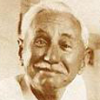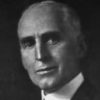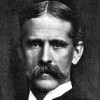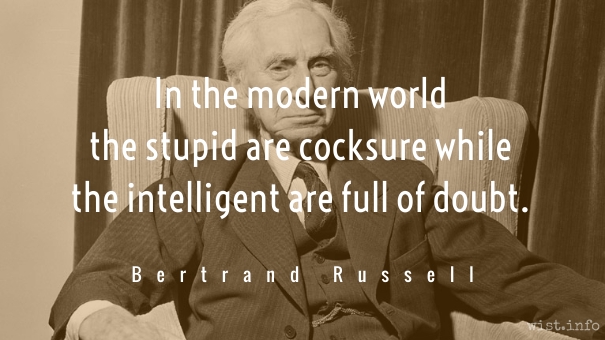To be born enlightened: that is highest. To study and so become enlightened: that is next. To feel trapped and so study: that is third. To feel trapped and never study: that is the level of the common people, the lowest level.
[孔子曰、生而知之者、上也、學而知之者、次也、 困而學之、又其次也、困而不學、民斯爲下矣。]
Confucius (c. 551- c. 479 BC) Chinese philosopher, sage, politician [孔夫子 (Kǒng Fūzǐ, K'ung Fu-tzu, K'ung Fu Tse), 孔子 (Kǒngzǐ, Chungni), 孔丘 (Kǒng Qiū, K'ung Ch'iu)]
The Analects [論語, 论语, Lúnyǔ], Book 16, verse 9 (16.9) (6th C. BC – AD 3rd C.) [tr. Hinton (1998)]
(Source)
Brooks says this was interpolated into Book 16 at the time of Book 18. (Source (Chinese)). Alternate translations:
Those who are born with the possession of knowledge are the highest class of men. Those who learn, and so, readily, get possession of knowledge, are the next. Those who are dull and stupid, and yet compass the learning, are another class next to these. As to those who are dull and stupid and yet do not learn; -- they are the lowest of the people
[tr. Legge (1861), sec. 2]
They whose knowledge comes by birth are of all men the first (in understanding); they to whom it comes by study are next; men of poor intellectual capacity, who yet study, may be added as a yet inferior class; and lowest of all are they who are poor in intellect and never learn.
[tr. Jennings (1895)]
The highest class of men are those who are born with a natural understanding. The next class are those who acquire understanding by study and application. There are others again who are born naturally dull, but who yet by strenuous efforts, try to acquire understanding: such men may be considered the next class. Those who are born naturally dull and yet will not take the trouble to acquire understanding: such men are the lowest class of the people.
[tr. Ku Hung-Ming (1898)]
Those who have innate wisdom take the biggest rank. Those who acquire it by study rank next. Those who learn despite natural limitations come next. But those who are of limited ability and yet will not learn, -- these form the lowest class of men.
[tr. Soothill (1910)]
Those who know instinctively (as at birth) are the highest; those who study and find out, come next; those who are hampered and study come next. Those who are boxed in and do not study constitute the lowest people.
[tr. Pound (1933)]
Best are those who are born wise. Next are those who become wise by learning. After come those who have to toil painfully in order acquire learning. Finally, to the lowest class of the common people belong those who toil painfully without ever managing to learn.
[tr. Waley (1938)]
Those born with an understanding of the universe belong to the highest type of humanity. Those who understand it as the result of study come second. Those who study it with great difficulty come third. Because, owing to the difficulty, they do not study, the people come last.
[tr. Ware (1950)]
Those who are born with knowledge are the highest. Next come those who attain knowledge through stud. Next again come those who turn to study after having been vexed by difficulties. The common people, in so far as they make no effort to study even after having been vexed by difficulties, are the lowest.
[tr. Lau (1979)]
Those who know things from birth come first; those who know things from study come next; those who study things although the find them difficult come next to them; and those who do not study because they find things difficult, that is to say the common people, come last.
[tr. Dawson (1993)]
Those who have innate knowledge are the highest. Next come those who acquire knowledge through learning. Next again come those who learn through the trials of life. Lowest are the common people who go through the trials of life without learning anything.
[tr. Leys (1997)]
Those who know it at birth belong to the highest category; those who know it through learning belong to the second category; those hwo learn it when baffled belong to the third category; those who do not learn even when baffled -- such people belong to the lowest category.
[tr. Huang (1997)]
It is the first class that one gets the knowledge because of one's innateness, it is the second class that one gets the knowledge because of one's studying, it is the third class that one gets studying because of one's encountering the difficulty, and it is under the class that one who does not study even if one encounters difficulties.
[tr. Cai/Yu (1998), #435]
Knowledge (zhi 知) acquired through a natural propensity for it is its highest level; knowledge acquired through study is the next highest; something learned in response to difficulties encountered is again the next highest. But those among the common people who do not learn even when vexed with difficulties -- they are at the bottom of the heap.
[tr. Ames/Rosemont (1998)]
Those who know from birth are the highest, those who know it from study are next, those who despite difficulties study it are next after that. Those who in difficulties do not study: these are the lowest.
[tr. Brooks/Brooks (1998)]
Those who are born understanding it are the best; those who come to understand it through learning are second. Those who find it difficult to understand and yet persist in their studies come next. People who find it difficult to understand but do not even try to learn are the worst of all.
[tr. Slingerland (2003)]
Those born with understanding rank highest. Those who study and gain understanding come next. Those who face difficulties and yet study—they are next. Those who face difficulties but never study—they are the lowest type of people.
[tr. Watson (2007)]
Those who are born with knowledge are at the top. Next are those who acquire knowledge through learning. Behind them are those who have difficulties [absorbing knowledge] but are still determined to learn. And at the bottom are people who have difficulties [absorbing knowledge] and do not even attempt to learn.
[tr. Chin (2014)]
This appears to be the source of the following aphorism frequently attributed to Confucius, and recorded in James Wood, ed., Dictionary of Quotations (1893):
By three methods we may learn wisdom: First, by reflection, which is noblest; Second, by imitation, which is easiest; and third by experience, which is the bitterest.
For more discussion of that Wood "translation":
Quotations about:
wisdom
Note not all quotations have been tagged, so Search may find additional quotes on this topic.
He who breaks a thing to find out what it is has left the path of wisdom.
J.R.R. Tolkien (1892-1973) English writer, fabulist, philologist, academic [John Ronald Reuel Tolkien]
The Lord of the Rings, Vol. 1: The Fellowship of the Ring, Book 2, ch. 1 “The Council of Elrond” [Gandalf to Saruman] (1954)
(Source)
The empty pageant; a stage play; flocks of sheep, herds of cattle; a tussle of spearmen; a bone flung among a pack of curs; a crumb tossed into a pond of fish; ants, loaded and laboring; mice, scared and capering; puppets, jerking on their strings — that is life. In the midst of it all you must take your stand, good-temperedly and without disdain, yet always aware that a man’s worth is no greater than the worth of his ambitions.
[Πομπῆς κενοσπουδία, ἐπὶ σκηνῆς δράματα, ποίμνια, ἀγέλαι, διαδορατισμοί, κυνιδίοις ὀστάριον ἐρριμμένον, ψωμίον εἰς τὰς τῶν ἰχθύων δεξαμενάς, μυρμήκων ταλαιπωρίαι καὶ ἀχθοφορίαι, μυιδίων ἐπτοημένων διαδρομαί, σιγιλλάρια νευροσπαστούμενα. χρὴ οὖν ἐν τούτοις εὐμενῶς μὲν καὶ μὴ καταφρυαττόμενον ἑστάναι, παρακολουθεῖν μέντοι, ὅτι τοσούτου ἄξιος ἕκαστός ἐστιν, ὅσου ἄξιά ἐστι ταῦτα περὶ ἃ ἐσπούδακεν.]
Marcus Aurelius (AD 121-180) Roman emperor (161-180), Stoic philosopher
Meditations, Book 7, #3 [tr. Staniforth (1964)]
(Source)
Original Greek. Alternate translations:
Public shows and solemnities with much pomp and vanity, stage plays, flocks and herds; conflicts and contentions: a bone thrown to a company of hungry curs; a bait for greedy fishes; the painfulness, and continual burden-bearing of wretched ants, the running to and fro of terrified mice: little puppets drawn up and down with wires and nerves: these be the objects of the world. among all these thou must stand steadfast, meekly affected, and free from all manner of indignation; with this right ratiocination and apprehension; that as the worth is of those things which a man doth affect, so is in very deed every man's worth more or less.
[tr. Casaubon (1634)]
Gazing after triumphs, and cavalcades; the diversions of the stage; farms well stocked with flocks and herds; contests for victory in the field; these are the little pleasures, and concerns of mortals. Would you have a farther illustration, and see an image of them elsewhere? Fancy then that you saw two or three whelps quarrelling about a bone; fishes scrambling for a bait; pismires in a peck of troubles about the carriage of a grain of wheat; mice frighted out of their wits; and scouring cross the room; poppets dancing upon a wire, etc. And after all, though humane life is but ordinary, and trifling, a wise man must be easy and good-humored, and not grow splenetic, or haughty upon the contemplation. Remembering notwithstanding, that the true bulk and bigness of a man, is to be measured by the size of his business, and the quality of his inclinations.
[tr. Collier (1701)]
The idle business of show, plays on the stage, flocks of sheep, herds, exercises with spears, a bone cast to little dogs, a bit of bread into fishponds, laborings of ants and burden-carrying, runnings about of frightened little mice, puppets pulled by strings—[all alike]. It is thy duty then in the midst of such things to show good humor and not a proud air; to understand however that every man is worth just so much as the things are worth about which he busies himself.
[tr. Long (1862)]
Gazing after shows, the diversions of the stage, farms well stocked with flocks and herds, contests for victory in the field are all much the same. So, too, a bone thrown to puppies, fishes scrambling for a bait, ants laboriously carrying a grain of wheat, mice frighted out of their wits and running away, puppets danced upon a wire. And in the midst of them a wise man must be good-humored, and not grow haughty in the contemplation. Remembering, notwithstanding, that the true worth of a man is to be measured by the objects he pursues.
[tr. Zimmern (1887)]
A procession's vain pomp, plays on a stage, flocks, herds, sham fights, a bone thrown to puppies, a crumb into fishponds, toiling and moiling of ants carrying their loads, scurrying of startled mice, marionettes dancing to strings. Well, then, you must stand up in all this, kindly and not carrying your head proudly; yet understand that every man is worth just so much as the worth of what he has set his heart upon.
[tr. Farquharson (1944)]
Pointless bustling of processions, opera arias, herds of sheep and cattle, military exercises. A bone flung to pet poodles, a little food in the fish tank. The miserable servitude of ants, scampering of frightened mice, puppets jerked on strings. Surrounded as we are by all of this, we need to practice acceptance. Without disdain. But remembering that our own worth is measured by what we devote our energy to.
[tr. Hays (2003)]
Without courage, wisdom bears no fruit.
[Sin valor es estéril la sabiduría.]
Baltasar Gracián y Morales (1601-1658) Spanish Jesuit priest, writer, philosopher
The Art of Worldly Wisdom [Oráculo Manual y Arte de Prudencia], § 4 (1647) [tr. Maurer (1992)]
(Source)
(Source (Spanish)). Alternate translations:
Knowledge is barren, if Valour do'nt accompany it.
[Flesher ed. (1685)]
Knowledge without courage is sterile.
[tr. Jacobs (1892)]
Without courage, the mind is dead.
[tr. Fischer (1937)]
Many would be wise if they did not think themselves wise.
[Serían sabios algunos si no creyesen que lo son.]
Baltasar Gracián y Morales (1601-1658) Spanish Jesuit priest, writer, philosopher
The Art of Worldly Wisdom [Oráculo Manual y Arte de Prudencia], § 176 (1647) [tr. Jacobs (1892)]
(Source)
(Source (Spanish)). Alternate translations:
Some would be wise, if they did not think themselves so.
[Flesher ed. (1685)]
Some would be wise if they did not believe themselves wise.
[tr. Fischer (1937)]
Some would be sages if they did not believe they were so already.
[tr. Maurer (1992)]
HECTOR: Modest doubt is called
The beacon of the wise.William Shakespeare (1564-1616) English dramatist and poet
Troilus and Cressida, Act 2, sc. 2, l. 15ff (2,2,15-16) (1602)
(Source)
The possession of facts is knowledge; the use of them is wisdom; the choice of them, education. Knowledge is not power but riches, and like them, has its value in spending.
Whom the gods would destroy they first make mad with power;
The mills of God grind slowly, but they grind exceedingly small;
The bee fertilizes the flower it robs;
When it is dark enough, you can see the stars.Charles Beard (1874-1948) American historian
Summary of human history, in reply to George S. Counts
Whether the succeeding generation is to be more virtuous than their predecessors, I cannot say; but I am sure they will have more worldly wisdom, and enough, I hope, to know that honesty is the 1st chapter in the book of wisdom.
Thomas Jefferson (1743-1826) American political philosopher, polymath, statesman, US President (1801-09)
Letter to Nathaniel Macon (1819-01-12)
(Source)
Usually just the last phrase is given, and transcribed as "Honesty is the first chapter in the book of wisdom."
More information about this quotation:
To be glad of life because it gives you to chance to love and to work and to play and to look up at the stars — to be satisfied with your possessions but not content with yourself until you have made the best of them — to despise nothing in the world except falsehood and meanness, and to fear nothing except cowardice — to be governed by you admirations rather than by your disgusts — to covet nothing that is your neighbors except his kindness of heart and gentleness of manners — to think seldom of your enemies, often of your friends, and every day of Christ; to spend as much time as you can in God’s out-of doors — these are the little guideposts on the foot-path to peace.
Henry Van Dyke (1852-1933) American clergyman and writer
“The Foot-path to Peace,” Tacoma Times (1 Jan 1904)
(Source)
Often shortened to: "Be glad for life because it gives you the chance to love and to work and to look up at the stars."
Brute force plays a much larger part in the government of the world than it did before 1914, and what is especially alarming, force tends increasingly to fall into the hands of those who are enemies of civilization. The danger is profound and terrible; it cannot be waved aside with easy optimism. The fundamental cause of the trouble is that in the modern world the stupid are cocksure while the intelligent are full of doubt.
Bertrand Russell (1872-1970) English mathematician and philosopher
“The Triumph of Stupidity,” New York American (1933-05-10)
(Source)
Often paraphrased, "The trouble with the world is that the stupid are cocksure, and the intelligent are full of doubt." See also Yeats and Bukowski.
More examination of this quotation: The Best Lack All Conviction While the Worst Are Full of Passionate Intensity – Quote Investigator.
For it is the part of a wise man to resolve beforehand that whatever can happen to a brave man is to be endured with patience if it should happen. It is indeed a proof of altogether greater wisdom to act with such foresight as to prevent any such thing from happening; but it is a token of no less courage to bear it bravely if it should befall one.
[Est enim sapientis, quidquid homini accidere possit, id praemeditari ferendum modice esse, si evenerit. Majoris omnino est consilii providere ne quid tale accidat, animi non minoris fortiter ferre si evenerit.]
Marcus Tullius Cicero (106-43 BC) Roman orator, statesman, philosopher
Philippics, No. 11, ch. 3 / sec. 7 (11.7) (late Feb AD 43) [tr. Yonge (1903)]
(Source)
(Source (Latin)). Alternate translations:
For it is the part of a wise man to resolve beforehand that whatever can happen to a man should be borne calmly if it should befall him. It needs altogether great judgment to provide against such evil happening and no less courage to bear it with fortitude if it should befall.
[tr. Ker (1926)]
It is the mark of a wise man ever to consider, reflect, that whatever may happen to him should be borne with patience. It is, however, a mark of greater wisdom to take every precaution against the occurrence of any thing unpleasant, of a reverse of fortune; but it is an indication of a mind in no wise inferior bravely and manfully to submit to any change of fortune, however unpleasant, untoward, unfavorable, unpropitious.
[Source]
This appears to the the source of the paraphrase: "To yield to occasion is the mark of a wise man."
Good sense is of all things in the world the most equally distributed, for everybody thinks he is so well supplied with it, that even those most difficult to please in all other matters never desire more of it than they already possess.
[Le bon sens est la chose du monde la mieux partagée; car chacun pense en être si bien pourvu, que ceux même qui sont les plus difficiles à contenter en toute autre chose n’ont point coutume d’en désirer plus qu’ils en ont.]
René Descartes (1596-1650) French philosopher, mathematician
Discourse on Method [Discours de la méthode], Part 1, Opening Words (1637) [tr. Haldane & Ross (1911)]
(Source)
(Source (French)). Alternate translations:
Right understanding is the most equally divided thing in the World; for every one beleevs himself so well stor’d with it, that even those who in all other things are the hardest to be pleas’d, seldom desire more of it then they have.
[Newcombe ed. (1649)]
Good sense is, of all things among men, the most equally distributed; for every one thinks himself so abundantly provided with it, that those even who are the most difficult to satisfy in everything else, do not usually desire a larger measure of this quality than they already possess.
[tr. Veitch (1850)]
Good sense is the most fairly distributed thing in the world; for everyone thinks himself so well supplied with it, that even those who are hardest ot satisfy in every other way do not usually desire more of it than they already have.
[tr. Ascombe & Geach (1971)]
Good sense is the best distributed thing in the world: for everyone thinks himself so well endowed with it that even those who are hardest to please in everything else do not usually desire more of it than they possess.
[tr. Cottingham, Stoothoff (1985), sec. 1]
Common sense is the best distributed commodity in the world, for every man is convinced that he is well supplied with it.
[Oxford Reference]
Of all things, good sense is the most fairly distributed: everyone thinks he is so well supplied with it that even those who are the hardest to satisfy in every other respect never desire more of it than they already have.
Nothing is more fairly distributed than common sense: no one thinks he needs more of it than he already has.
God, give us the grace to accept with serenity the things which cannot be changed, courage to change the things which should be changed, and the wisdom to distinguish the one from the other.
Reinhold Niebuhr (1892-1971) American theologian and clergyman
“The Serenity Prayer” (1934)
Niebuhr at one point claimed authorship (and took copyright fees from Hallmark Cards), but later on denied he had written it. It was later adopted by Alcoholics Anonymous. Discussion of the actual authorship here.
ALBANY: Wisdom and goodness to the vile seem vile.
Filths savor but themselves.William Shakespeare (1564-1616) English dramatist and poet
King Lear, Act 4, sc. 2, l. 47ff (4.2.47-48) (1606)
(Source)






















